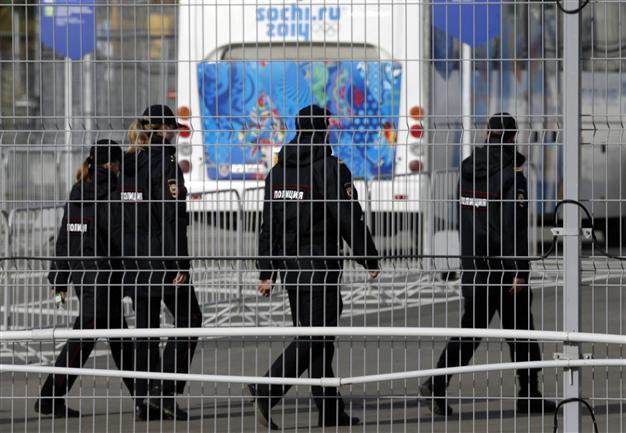US-Russia tensions flare over Winter Olympics security
WASHINGTON - Agence France-Presse

Security guards patrol at the Olympic Park in Adler near Sochi January 16, 2014. REUTERS Photo
The Sochi Winter Olympics have opened up a new front of distrust between the United States and Russia, with tensions simmering over security preparations amid fears the games could be targeted by extremist militants.Analysts say the former Cold War rivals are unlikely to risk a full-blown confrontation over security in Sochi, the first Olympics held on Russian soil since the U.S.-boycotted 1980 Moscow Games. Nevertheless, some experts say the failure of the United States and Russia to engage fully over a range of issues could ultimately compromise security at the Olympics.
Micah Zenko, an expert on national security at the Council on Foreign Relations think tank, argued that the “safety and security of everyone attending the Winter Olympics is being put at further unnecessary risk because of the reciprocal distrust between Russia and U.S. counterterrorism and intelligence agencies.” The White House has expressed “concern” about an uptick in reported threats by violent extremists relating to the Sochi Games.
Security fears have been exacerbated by two suicide bombings in the southern city of Volgograd last month, Russia’s deadliest in three years, that killed 34 people. Other senior U.S. officials meanwhile have complained that Russia has “not been forthcoming in sharing specific threat information.” The U.S.
Olympic Committee has advised athletes heading to Sochi to avoid wearing their team uniforms or Team USA logos outside of Olympic venues during the Feb. 7 to 23 multi-sport event to avoid being targeted.
According to Temuri Yakobashvili, the former deputy prime minister of Georgia and ex-ambassador to the United States, the American concerns are “are very legitimate.”
“The U.S. government obviously should be very cautious and should be very concerned because of the anti-American sentiment,” said Yakobashvili, an expert with the German Marshall Fund of the United States, a public policy think tank.
In a video released earlier this month, militants from the Caucasus region threatened to mount attacks on the Olympics, vowing to deliver a “present” to President Vladimir Putin as well as overseas tourists visiting the games.
“We have been talking to the Russians about the regional security concerns we have. These are longstanding concerns about the North Caucasus,” a senior official in President Barack Obama’s administration told journalists last week. The official acknowledged the administration’s “frustration” over a level of intelligence sharing by Russia deemed to be insufficient.
“This is a tough issue because it’s an issue of intelligence,” the official said. “We have good relations, we have good conversations, but we always want to know more. “So what you’re hearing is frustration that we don’t know everything.” Russia countered the criticism through Moscow’s ambassador to Washington, insisting the cooperation was satisfactory.
“It’s good enough,” Sergei Kislyak told CNN’s “State of the Union” program. “And you need to remember, it’s Olympic Games that are being held in Russia. And we have pretty solid capabilities to deal with it on our own.
“I don’t see any tension. I didn’t feel any tension,” he added, predicting a “secure, peaceful and successful” Olympics.
Nevertheless, Zenko of the Council on Foreign Relations said the U.S. and Russia remain locked in a stand-off of mutual distrust.
“Russia does not want to provide information that could reveal the sources and methods of how it collects human and signals intelligence, while the United States will not share jamming technology that could defeat radio-signal car bombs, because Russia could share or use that information to develop countermeasures that overcome those jammers,” Zenko said.
Republican U.S. lawmaker Peter King said the United States was wary of sharing technology with Russia. “I can understand why people in our government would be reluctant to share a very sophisticated piece of technology, which could be used against us in the future,” he told ABC television’s “This Week.” Yakobashvili said he did not expect the U.S. and Russia to “clash” over the issue of security.
“I don’t think that the United States is trying by any means to confront the Russian federation and its leadership,” he said. In fact, Washington has repeatedly offered security assistance to Moscow.
Obama and Putin engaged in telephone diplomacy last week, while the Pentagon has said it is ready to deploy air and naval assets, including moving two warships into the Black Sea. Russia has rejected the offers.
















